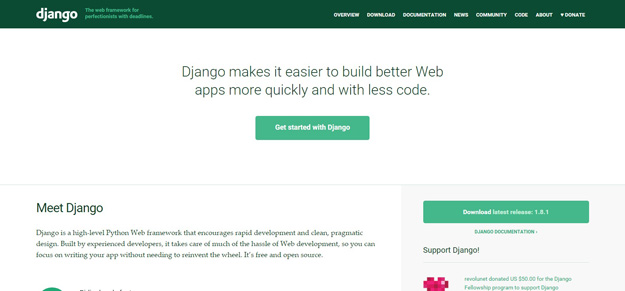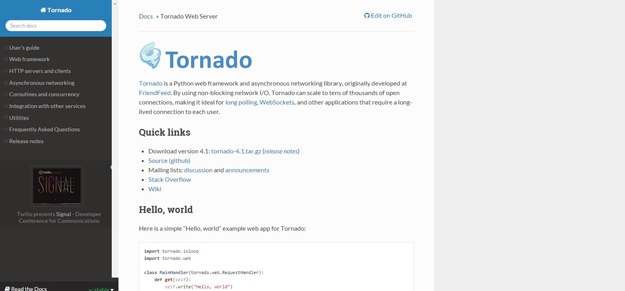12 個最好的 Python 框架用于快速開發
1. Django</h2>
1. Django</h2>

Django is a high-level Python Web framework that encourages rapid
development and clean, pragmatic design. Built by experienced
developers, it takes care of much of the hassle of Web development, so
you can focus on writing your app without needing to reinvent the wheel.
It’s free and open source. Django takes security seriously and helps
developers avoid many common security mistakes.
2. CherryPy

CherryPy is among the oldest web framework available for Python, yet
many people aren’t aware of its existence. One of the reason for this is
that CherryPy is not a complete stack with built-in support for a
multi-tier architecture. It doesn’t provide frontend utilities nor will
it tell you how to speak with your storage. Instead, CherryPy’s take is
to let the developer make those decisions. This is a contrasting
position compared to other well-known frameworks. CherryPy has a clean
interface and does its best to stay out of your way whilst providing a
reliable scaffolding for you to build from. Typical use-cases for
CherryPy go from regular web application with user frontends (think
blogging, CMS, portals, ecommerce) to web-services only.
3. Flask

Flask is a microframework because of its extensible yet simple core. A
new programmer might find it lacking several features such as form
validation, database abstraction layer, and use of third-party libraries
for adding common features. However, it allows extensions that make it
comparatively easier to add the required functionality.
4. Bottle

Bottle is a fast, simple and lightweight WSGI micro web-framework for
Python. It is distributed as a single file module and has no
dependencies other than the Python Standard Library. It provides support
for apps like the Google App Engine, Python Paste, and includes several
templates like Cheetah and Mako.
5. Pyramid

Pyramid is a very general open source Python web framework. As a
framework, its primary job is to make it easier for a developer to
create an arbitrary web application. The type of application being
created isn’t really important; it could be a spreadsheet, a corporate
intranet, or a social networking platform. Pyramid is general enough
that it can be used in a wide variety of circumstances.
6. Klein

Klein is a micro-framework for developing production-ready web services
with Python. It’s built on widely used and well tested components like
Werkzeug and Twisted, and has near-complete test coverage.
7. Morepath

Morepath is an Python WSGI microframework. It uses routing, but the
routing is to models. Morepath is model-driven and flexible, which makes
it expressive.
8. Web.py

Web.py is a web framework for Python that is as simple as it is
powerful. web.py is in the public domain; you can use it for whatever
purpose with absolutely no restrictions. You can comfortably write web
apps in python; hence, taking the liability out of frameworks.
Programmers enjoy working on web.py because of its zero limitations and
ease of use. Some programmers might find its fewer features limiting;
however, it allows room for successful integration and you don’t have to
carry on all of these features, especially when you don’t need them.
9. ObjectWeb

ObjectWeb is a fast, minimalist, pure-Python web framework that relies
on no third party libraries. It is designed around using Python as it
was originally intended to be used: as an Object Oriented Programming
language. ObjectWeb supports the CGI and WSGI standards and has a
built-in development server.
10. Pecan

Pecan was created to fill a void in the Python web-framework world – a
very lightweight framework that provides object-dispatch style routing.
Pecan does not aim to be a “full stack” framework, and therefore
includes no out of the box support for things like sessions or
databases. Pecan instead focuses on HTTP itself.
11. Tornado

Tornado is a Python web framework and asynchronous networking library,
originally developed atFriendFeed. By using non-blocking network I/O,
Tornado can scale to tens of thousands of open connections, making it
ideal for long polling, WebSockets, and other applications that require a
long-lived connection to each user.
12. Grok

Grok is a web application framework for Python developers. It is aimed
at both beginners and very experienced web developers. Grok has an
emphasis on agile development. Grok is easy and powerful. If you are
starting into web applications, Grok can offer multiple building blocks
and it has an excellent community, which is always ready to support. It
offers a much simpler but rather agile mode of learning Python.